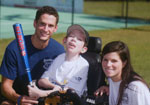|
|
|

|
Child brings passion to student's work
|
by Dawn Brazell
Public Relations
Katlyn McGrattan learned from the volunteer work in her life a lesson
that takes some people decades to learn—that passion keeps hard work
from turning into burnout.
This revelation came, in part, from a young boy with cerebral palsy.
When McGrattan came from New York State to Charleston to attend
graduate school at MUSC’s College of Health Professions, she needed to
work to help pay the bills. She decided to help the McCurry family with
their son, Luke.
It was supposed to be for one evening a week, but then she got involved
with The Miracle League and found herself at the McCurry’s house at all
hours.
“They’ve kind of taken me in as their second family. They’re my
Southern parents, I feel.”
 Eric Glover and
Katlyn McGrattan with Luke McCurry. McGrattan will earn her master of
science in rehabilitation science communication sciences degree today. Eric Glover and
Katlyn McGrattan with Luke McCurry. McGrattan will earn her master of
science in rehabilitation science communication sciences degree today.
Luke’s mom, Beth McCurry, would agree. She said she was scared that
McGrattan wouldn’t be able to handle her son, who has severe cerebral
palsy and a hearing impairment. “Katlyn jumped right in with no
hesitation and formed a bond with him immediately. At first I was
concerned because she is very petite, but I learned right away that she
is small but mighty.”
McGrattan said Luke has taught her balance. She had a professor in her
freshman year in undergraduate school at the College of St. Rose in
Albany who taught her that claiming time efficiency was the key to
success. The teacher recommended having some form of study material
available at all times, even the three minutes that it takes to wait in
the grocery line. McGrattan took that to heart, and the advice served
her well.
Her typical day as a MUSC graduate student would begin at 4:50 a.m.,
when she would run on the treadmill while reviewing class notes. The
rest of the day was planned out to the minute with study times inserted
into any down slots. This non-stop schedule used to get to her, as she
was trying to speed up time until school was done, she said.
“Interestingly enough, I soon realized that the commitments you make
throughout the day don’t work as a math equation—each added commitment
weighing you down more and more. Instead, I found that certain
commitments subtracted from this daily stress.”
She learned this from Luke and her years spent mentoring an adult with
Asperger’s Disorder, who needs help with his social and communication
skills.
“It’s through my work and volunteer experiences with these families
that I find I am able to appreciate those parts of my life that at one
point had been my headaches. Oddly enough, the reason I decided to
pursue my doctorate did not come during a clinical experience or a
classroom, it came from one of these extra commitments with a child
that has cerebral palsy. The time I have spent with him and his family
has provided me the passion to want to find answers that so far have
not been found.”
One of her MUSC professors, Bonnie Martin-Harris, Ph.D. said McGrattan
is a voracious learner, who drives herself without imposing on others.
As one of three sisters, McGrattan has taken the initiative to fund her
education through various employment opportunities that have enriched
her research and education.
Martin-Harris said she likes how McGrattan is motivated to seek answers
to improve patient care based on her sincere compassion and empathy for
the plights of families with whom she has become involved. She’s
organized and systematic in mapping her career course in the study of
innovative approaches to improve pediatric feeding, swallowing and
communication disorders.
This is high praise for McGrattan, who has set Martin-Harris as one of
her role models. McGrattan walked out of one of Martin-Harris’ classes
one day and told a friend that her goal was to be just like her. Her
friend laughed.
“I said, ‘No, seriously, I want to be just like her.’ She was amazing.
She was professional and didn’t get pushed around by anyone. She knew
her stuff.”
McGrattan, who has decided to pursue her doctorate in health and
rehabilitation sciences, said she hopes to teach one day and continue
research to find better treatments for the speech and communication
disorders that can severely affect the quality of life of patients. She
also wants to develop a systematic plan of treatment for communication
disorders in hospitals since there can be a wide disparity in
standards, she said.
In the meantime, she jokes with Luke that she’s still working on a cure
for tongue thrust, a condition that affects his ability to eat and
talk. He’ll laugh. The laugh puts everything in perspective for
McGrattan.
“He has such a great attitude. It’s hard for him to write or even eat
or talk, and he just never complains. He’s at the top of my list as
something I can aspire to be. I feel lucky to have met him.”
Friday, May 21, 2010
|
|
|



